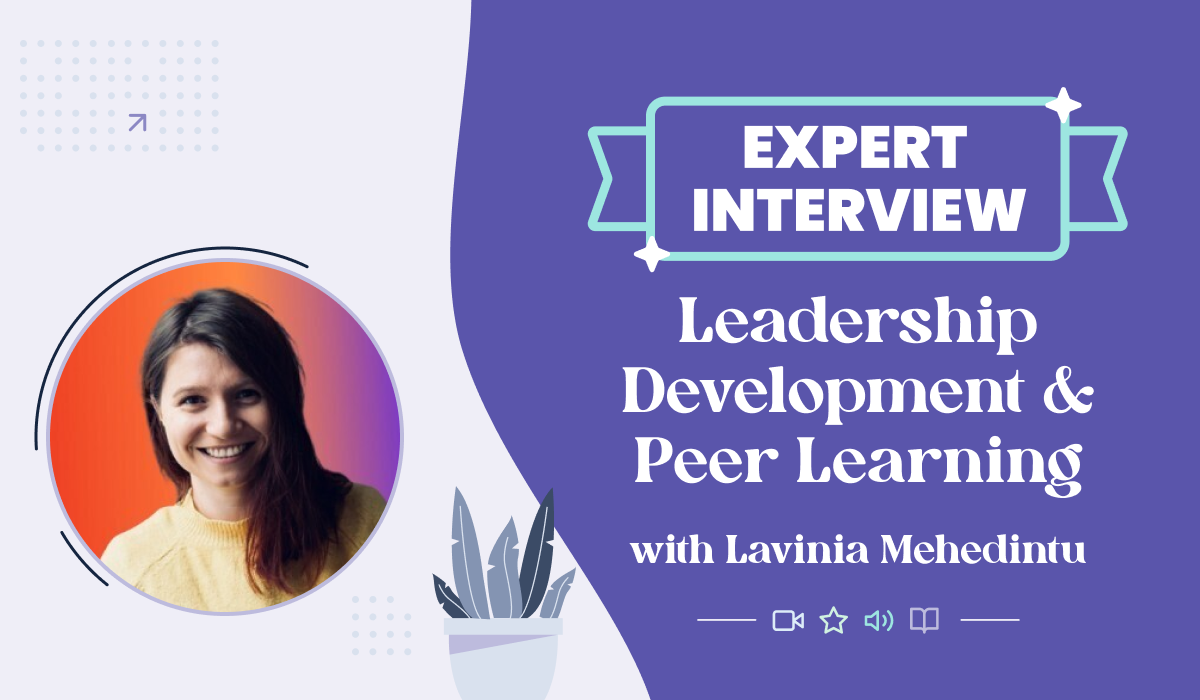Read
Listen
Interviews
Events
Paths
 Leadership Development & Peer Learning with Lavinia Mehedintu
Leadership Development & Peer Learning with Lavinia MehedintuOffBeat co-founder Lavenia Mehedintu talks about how to set up leadership development and peer learning programs at any company, plus more.
See Complete Playlist
Participants
2
Lavinia Mehedințu
Co-Founder & Learning Architect at OffBeat


Daniel Carter
CRO at Innential

Follow this interview using Innential Path

Leadership Development & Peer Learning
OffBeat co-founder Lavenia Mehedintu talks about how to set up leadership development and peer learning programs at any company, plus more.Enter PathConvincing Stakeholders
Share
Key Takeaways
Q: How to pitch your L&D initiative to stakeholders?
A: The short answer: do your due diligence!
The long answer: your business initiatives need to be backed by a business case. Prepare for the questions stakeholders might have, but also be concise (Concise with a pitch but with your research be as detailed as you can. Be prepared for any question).
Preparing a pitch for stakeholders:
Start with a problem to solve or an opportunity we can chase as a business.
Do not jump into the solution for the problem, show how you find the problem itself.
Present your initiative (potential solution) for the problem and why my idea is the best.
Present what budget we have and all of the resources.
Collecting data is important but presenting it in a good way is powerful. Do not stop at a problem, try to understand it and analyze why your idea was not the best one.
Q: How should you format your pitch?
A: Three tips:
Maximum of 2 pages to read (keep it concise)
If pitching in front of an audience using PowerPoint is fine.
If you send the pitch, first send the summary (max 2 pages) and then all the research.
Q: What are common mistakes people make when pitching?
A: There are a few:
Starting the pitch with the solution/our idea to solve a problem. It is better to start with a problem/opportunity.
Not careful enough with drawing the connection between the problem and the solution.
Overconfidence bias when you do not see the risk, it is better to be careful and self critical. Have a list of risks and how to mitigate them if you can, if not it is also okay.
Do not go into many details, summarizing is better.
Not having the backup plan. Have a backup plan, even small changes in your original solution or less impressive solution would be great.
Not asking for feedback. Ask for feedback, it might not improve your current solution but will help in the future.
Q: How to overcome stakeholder resistance?
A: There are 3 aspects that help:
Resilience – ask yourself WHY are you doing this, have a clear goal then it is easier to recover.
Learning – asking questions, see the barriers as your opportunity to learn.
Celebration – re-energizing yourself, have small celebrations moments.
“The barriers you face in your career will shape you.”
Q: How to get buy-in from different stakeholder levels?
A: It depends on a lot of factors, but here’s what I’ve experienced:
C-level: still cares about revenue, market share and growth and less about a fulfilling work environment. It needs more work to show that the work environment needs to be prioritized. There should be a balance between the two.
Team leads: delivering on their promise, personal growth, personal career and work life balance.
Individual contributors: People care a lot about their mental health, work life balance, and impact.
“The best thing you can do is to go out there and just. Listen to people, even if you don't talk precisely about what's important for them, just listen to them because what they say will reveal what's actually important for them”
Early initiators/team leads that are passionate about L&D are valuable because their excitement permeates onto others and motivates them to work.
Interview Shorts